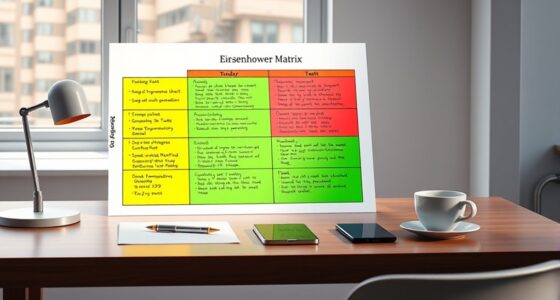To conduct a quick 20-minute weekly financial check-in, start by gathering your bank, credit card, and investment statements to review recent transactions. Track your spending against your budget, looking for any unusual charges or discrepancies. Assess your progress toward your financial goals, like savings or debt repayment, and identify steps for the upcoming week. Staying organized and consistent makes this process easy—and if you keep going, you’ll discover even more ways to improve your finances.
Key Takeaways
- Gather all recent financial documents and digital records for quick access.
- Review bank and credit card statements for transactions and unusual charges.
- Update your budget with recent expenses and adjust categories as needed.
- Assess progress toward savings, debt repayment, and financial goals.
- Set specific weekly goals, like paying down debt or saving, based on your review.
Gather Your Financial Documents and Tools

Before you begin your weekly financial check-in, gather all your relevant documents and tools. You’ll want to have your bank and investment statements, recent pay stubs, and records of your current investment strategies at hand. Check your emergency funds to guarantee they’re allocated properly and accessible if needed. Having these documents ready allows you to quickly review your financial progress and identify areas for adjustment. Use your phone or computer to access digital records, and keep a notebook for quick notes. Organizing everything beforehand saves time and keeps you focused during your check-in. Additionally, reviewing your merchant services and associated transaction data can help identify potential vulnerabilities or areas for cost savings. This preparation helps you stay on top of your finances, making sure your investment strategies align with your goals and your emergency fund remains sufficient.
Review Your Bank and Credit Card Statements

Now that you’ve gathered your financial documents, it’s time to review your bank and credit card statements. Look for recurring charges or unfamiliar transactions that might signal fraud or errors. Check your spending habits to identify areas where you can save or redirect funds toward investment opportunities. Keep an eye on your credit score by verifying that all reported information is accurate and up-to-date. Spotting discrepancies early helps maintain your financial health and can improve your credit standing. Also, review any fees or interest charges to ensure you’re not paying more than necessary. This quick check keeps you aware of your financial situation, helping you make informed decisions about your money and long-term goals. Incorporating predictive modeling insights can assist in forecasting future expenses and income trends to better plan your finances.
Track Your Spending and Update Your Budget

Tracking your spending regularly helps you stay aware of where your money goes and makes certain your budget remains accurate. By reviewing your expenses weekly, you can identify patterns in your cash flow and spot areas to cut back if needed. Updating your budget with recent transactions ensures it reflects your current financial situation, keeping you on track with your savings strategies. Use your bank and credit card statements to verify your spending and adjust categories as necessary. Incorporating budget calibration into your routine can further refine your financial plan. This habit not only prevents surprises but also empowers you to make informed financial decisions. Remember, staying consistent with this process helps you maintain control over your money and supports your long-term financial health.
Assess Your Financial Goals and Progress

Reviewing your spending and updating your budget provides a clear picture of your current financial habits, which sets the stage for evaluating your progress toward your goals. Now, take a moment to gauge how well you’re advancing in areas like investment planning and debt management. Are you contributing regularly to your savings or retirement accounts? Have you made progress toward paying off high-interest debt? Use your updated budget to compare actual spending against your goals. If you’re falling behind, identify where adjustments are needed, such as cutting back on non-essentials or reallocating funds. Celebrating small wins can motivate you to stay on track. Regularly assessing your goals keeps you focused, helps you adjust strategies, and ensures your financial plan remains aligned with your long-term aspirations. Recognizing your financial progress can also reinforce positive habits and encourage continued effort.
Identify Any Unusual or Unexpected Expenses

Unanticipated expenses can quickly disrupt your financial progress if you’re not paying close attention. During your weekly check-in, look for unexpected charges or irregular expenses that stand out from your usual spending. These might include emergency repairs, medical bills, or one-time purchases. Identifying these unusual costs helps you understand where your money is going and prevents surprises later. Review your bank and credit card statements carefully, noting any charges that seem out of place or higher than expected. Being aware of financial irregularities allows you to catch issues early and take corrective action. By catching irregular expenses early, you can adjust your budget or plan for future months. Staying aware of unexpected charges ensures you maintain control over your finances and avoid slipping behind on your financial goals.
Plan and Set Goals for the Coming Week

Have you thought about what you want to accomplish financially in the coming week? Setting clear goals helps you stay focused on your investment strategies and debt management. Think about specific targets, like paying down a certain amount of debt or researching new investment options. To keep it organized, use this simple table:
| Goal | Action Step |
|---|---|
| Reduce credit card debt | Make an extra payment this week |
| Increase savings | Transfer a set amount to savings account |
| Research investment options | Read one article on investment strategies |
| Review budget | Track expenses and adjust as needed |
| Plan next week’s goal | Set a new financial target |
Being aware of sound design techniques can also inspire creative ways to approach your financial goals, just as sound layering and manipulation can enhance audio projects.
Frequently Asked Questions
How Often Should I Adjust My Financial Goals?
You should review your financial goal updates regularly, ideally every few months, to guarantee they stay relevant and achievable. The goal adjustment frequency depends on your life changes and financial situation. If you experience a significant event, like a new job or expense, it’s wise to update your goals sooner. Otherwise, conduct an extensive review quarterly or biannually, adapting as needed to stay on track toward your financial targets.
What Should I Do if I Find Errors in My Statements?
If you find errors in your statements, you should promptly dispute the errors with your bank or financial institution. Contact them to report the mistake, providing any supporting documentation. They’ll help you correct the mistakes and confirm your records are accurate. Always review your statements regularly to catch errors early, and don’t hesitate to dispute errors to protect your finances and maintain accurate account information.
How Can I Stay Motivated to Stick to My Budget?
Ever wonder what keeps you motivated to stick to your budget? Developing a strong budgeting mindset helps you stay on track, and reward strategies make it enjoyable. Set small goals and celebrate each achievement, making progress rewarding. Keep reminding yourself of your financial dreams and how budgeting brings them closer. When you see progress, your motivation naturally grows—so stay committed and reward yourself along the way!
What Tools Are Best for Tracking Financial Progress?
You should explore budgeting apps like Mint or YNAB, which help you track expenses and set goals easily. Spreadsheet templates are also great for customizing your financial progress and staying organized. These tools provide clear visuals and real-time updates, so you can quickly see how you’re doing each week. Using both can give you a thorough view and keep you motivated to stay on top of your finances.
When Is the Best Time of Day to Do My Check-In?
Think of your daily routine as a garden that needs regular tending. The best time of day for your financial check-in is when your mental energy is highest, often in the morning or early evening. This way, you can nurture your financial health with clarity and focus. Pick a consistent time that fits your schedule, making it a natural part of your daily routine, like watering your plants.
Conclusion
With a quick weekly check-in, you keep your finances fresh and focused. By balancing your budgets, spotting surprises, and setting smart goals, you stay in control. Consistent, clear, and caring, your financial flow becomes smoother and more secure. So, seize this simple, swift session, and see your savings soar, stress shrink, and success shine brighter. Making money management manageable, meaningful, and motivating starts with just 20 minutes a week.









